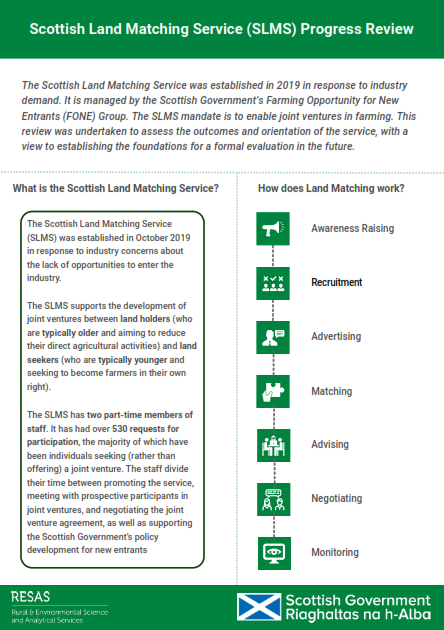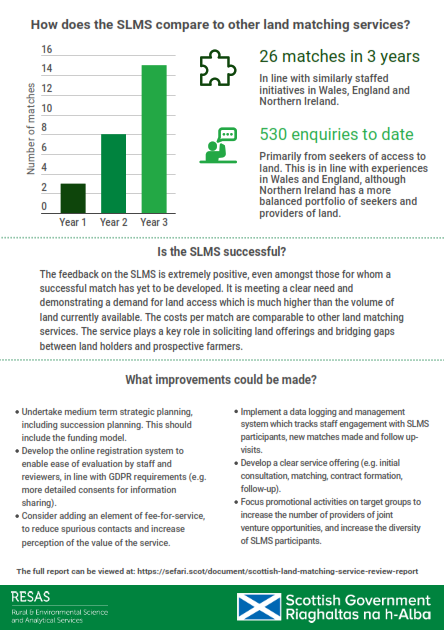The Scottish agricultural sector is facing a critical challenge of generational renewal, as highlighted by the June 2021 Agricultural Census, which revealed that 60% of female and 64% of male farmers in Scotland are over 55 years of age. To address this concern, the Scottish Land Matching Service (SLMS) was established by the Scottish Government in October 2019, with the aim of providing opportunities for new entrants to the industry and facilitating joint ventures between land holders and land seekers. A new report commissioned by the Scottish Government provides an informal review of the service comparing it to land matching services elsewhere in the United Kingdom and Republic of Ireland.


A visual summary based on the findings of the report has been produced by the Scottish Government's Rural & Environment Science & Analytical Services.
Comparing Favourably to Land Matching Services Across the UK
The SLMS has achieved commendable milestones comparable to similar initiatives in Wales, England, and Northern Ireland. Over the past three years, the SLMS facilitated 26 successful matches, in line with the staffing levels of other regions. It is essential to note that land matching is a medium-term process, often taking years from the identification of available assets to formalized matching. Thus, the SLMS's three matches in the first year, eight in the second, and 15 in the third exemplify steady progress. The service has received more than 530 inquiries primarily from land seekers, aligning with experiences in Wales and England, while Northern Ireland boasts a more balanced portfolio of seekers and providers.
Positive Feedback Highlights the Success of SLMS
Feedback from participants, including those who have yet to be matched, has been overwhelmingly positive. The SLMS has demonstrated its ability to meet a clear need and has generated substantial demand for land access, surpassing the currently available land supply. The costs per match remain on par with other land matching services. By effectively soliciting land offerings and bridging the gap between landholders and prospective farmers, the SLMS has played a pivotal role in the sector.
Enhancing the SLMS for a More Sustainable Future
Building upon its organic development, the SLMS recognizes the need for greater formalization and improvement to meet the evolving demands of the sector. The following strategies are proposed by the report authors for enhancing the SLMS:
- Medium-Term Strategic Planning: Undertake comprehensive strategic planning, including succession planning, to ensure long-term sustainability. Consider establishing a funding model and target-setting beyond the annual basis.
- Online Registration System: Develop an improved online registration system aligned with GDPR requirements, allowing for easy evaluation by staff and reviewers. Enhance the system's capabilities for measuring equality, diversity, and inclusion (EDI).
- Data Logging and Management: Implement a robust data logging and management system to track staff engagement, monitor new matches, and facilitate follow-up visits. Include an automated feedback system for participants to provide their valuable insights.
- Clear Service Offering: Develop a well-defined service offering that encompasses initial consultation, matching, contract formation, and follow-up. Introduce eligibility requirements such as UK residency and tax registration, and establish clear policies and procedures. Expand the service to include comprehensive follow-up support for successful matches.
- Introduction of Fee-for-Service: Consider implementing a fee-for-service structure to deter spurious contacts and enhance the perceived value of the SLMS. However, note that self-funding for land matching services remains unproven.
- Targeted Promotional Activities: Focus promotional efforts on specific target groups, including existing farmers as a support mechanism, crofters, agro-ecological farmers, and women new entrants. Highlight joint ventures as entrepreneurial activities that extend beyond traditional land matching, creating opportunities that encompass a broader spectrum.
Unlocking the Potential for Diversity in Scottish Farming and Crofting
The SLMS recognizes the untapped potential to foster diversity within the farming and crofting sectors.
Notes
This report was funded by the Rural & Environment Science & Analytical Services Division of the Scottish Government Underpinning National Capacity Support to Policy Function.
The review was led by Professor Lee-Ann Sutherland is Director of the James Hutton Institute's International Land Use Study Centre. Professor Sutherland's current research is on recreational approaches to farming engagement (both for non-commercial farmers and on-line gamers).
The content of this report does not reflect the official opinion of the Scottish Government. Responsibility for the information and views expressed therein lies entirely with the author.
The report is funded as part of the Scottish Government’s Environment, Natural Resources and Agriculture Research Portfolio’s research and expertise to ensure scientific evidence helps inform the health, wealth and wellbeing of Scotland.
The visual summary has been produced by the Scottish Government's Rural & Environment Science & Analytical Services and is based on the findings of the report.
There are also presentation slides available that highlight the key findings from the report.
The research component of the Portfolio is one of the largest, multidisciplinary programmes of strategic research in the UK, worth over £200 million across the five years.
For more information, please contact Lee-Ann.Sutherland@hutton.ac.uk
